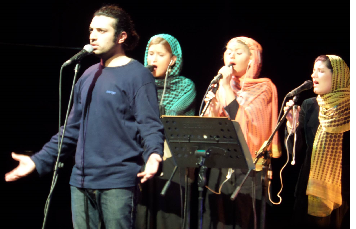Robin Wright (for The New Yorker)
 For decades, both before and after his 1979 revolution, Ayatollah Khomeini railed against “Westoxication”—the poisoning of Iran’s Islamic society by Western culture. The new theocracy banned everything from music and dancing to modern art. Tehran’s National Museum of Contemporary Art crated away Picassos, Pollocks, Warhols, and Mirós worth billions. Even chess, a game with local roots, was banned. The Islamic Republic has been consumed ever since with its own clash of cultures.
For decades, both before and after his 1979 revolution, Ayatollah Khomeini railed against “Westoxication”—the poisoning of Iran’s Islamic society by Western culture. The new theocracy banned everything from music and dancing to modern art. Tehran’s National Museum of Contemporary Art crated away Picassos, Pollocks, Warhols, and Mirós worth billions. Even chess, a game with local roots, was banned. The Islamic Republic has been consumed ever since with its own clash of cultures.
But female singers still face the toughest taboos. “Women’s voices should not be heard by men other than members of their own families,” Khomeini decreed. But when I was in Tehran, the fat woman literally sang in Iran—and Western pop songs, no less. To cheers and whistles in Tehran’s elegant opera house, Ghazal Shakeri belted out “Back to Black,” a provocative Amy Winehouse song. The lyrics had to be modified, but only a bit. Instead of “kept his dick with,” Shakeri sang “kept his lips with.” The performance was one of a dozen Western numbers incorporated into “The Last Days of Esfand,” an Iranian musical about a female psychiatrist treating a troubled young criminal. The two leads, Shakeri and a man named Ashkan Khatibi, sang several duets, including Abba’s rousing “The Winner Takes It All,” a poignant version of “Autumn Leaves,” and a spirited “Those Were the Days, My Friend,” which includes lines about raising “a glass or two” and singing and dancing forever. They were accompanied by three female backup singers (left).
Click here for the full article in The New Yorker.
Click here for the full article in The New Yorker.
Photo credit: Robin Wright
